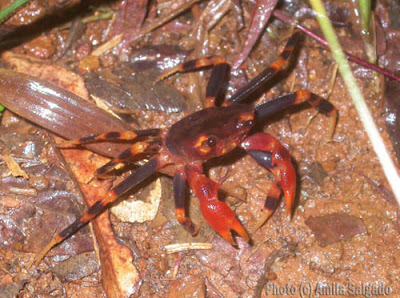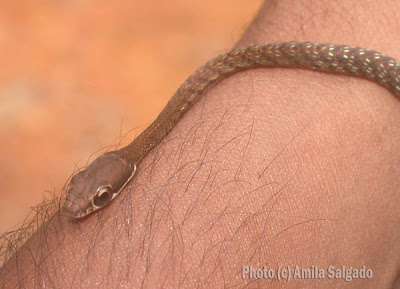
I joined the annual workshop on mixed species bird flock studies in Sinharaja rain forest conducted by FOGSL (Field Ornithology Group of Sri Lanka) from 8-11 November, 2007. The group this time were 20 plus local birders, mainly consisting of newbies.
Prof. Kotagama who usually heads this annual birding pilgrimage pulled out last minute due to work commitments; therefore, I became the leader by popular choice. We had good weather with a tinge of overnight rain, which didn’t really matter.
As usual when there are over 20 in a birding group, there tend to be a bit more chattering than is healthy for birding, so much so that birding gradually assumes secondary focus by around day 3 and 4!
Adding to this problem is what I call as the "newbie syndrome": new bird watchers expecting every bird to be spotted for them. And presented in a platter if possible!
So, one of the first things that I did early in the trip was to set a simple target for each person to spot at least one new bird for the rest of the group to see. If it was only seen by a few that wouldn’t count. Instead, it had to be shared among everybody. This wasn’t too unreasonable as we had over 3 full days’ for birding. It worked quite well, and we cleaned up most of the expected Sinharaja highlights by day our 2!
I personally sacrificed a lot of digiscoping opportunities to provide scope views of most of the flock-associated birds that stayed on long enough. It was a very nice feeling to share good sightings of birds—some of which were rarer species—with like minded people. They got great first looks at some of the endemics that I as a bird watcher took years to even get a glimpse of!
Apart from the usual flock-associated birds, other birding highlights included a fleeting glimpse of a pair of Sri Lanka Spurfowl, many Sri Lanka Junglefowl sightings, and prolonged views of the Green-billed Coucal near the entrance.

Highlight for me was a night walk that a few of us did with the member and naturalist Dulan Ranga, who has special interests in amphibians and reptiles. During this, we had a Common Wolf Snake Lycodon aulicus, a couple of sleeping Kangaroo Lizards Otocrypis wiegmanni, several unidentified amphibians of the genus Philautus; plus a few old-timers such as the Long-snouted tree Frog Polypedates longinasus, and Kelaart’s Dwarf Toad Adenomus kelaartii.
 We also had several Tree Climbing Crab Ceylonthelphusa scansor, which was discovered in 1995 from Sinharaja. Our only mammalian highlight during the night walk was Sambar Deer Cervus unicolor. I heard the call of Serendib Scops Owl below Martin’s (near the steam that flows down towards the village) at midnight. We didn’t try to find it.
We also had several Tree Climbing Crab Ceylonthelphusa scansor, which was discovered in 1995 from Sinharaja. Our only mammalian highlight during the night walk was Sambar Deer Cervus unicolor. I heard the call of Serendib Scops Owl below Martin’s (near the steam that flows down towards the village) at midnight. We didn’t try to find it. We also encountered several snakes during the daytime: Millard’s Hump-nosed Pit Viper Hypnale nepa, Common Bronzeback Dendrelaphis tristis, a possible Stripe-tailed Bronzeback Dendrelaphis caudolineolatus (featured below), and Sri Lanka Keelback Water Snake Xenochrophis asperrimus. Amazing what a few focused eyes could find!
We also encountered several snakes during the daytime: Millard’s Hump-nosed Pit Viper Hypnale nepa, Common Bronzeback Dendrelaphis tristis, a possible Stripe-tailed Bronzeback Dendrelaphis caudolineolatus (featured below), and Sri Lanka Keelback Water Snake Xenochrophis asperrimus. Amazing what a few focused eyes could find!























No comments:
Post a Comment